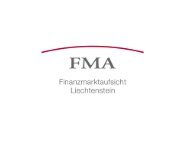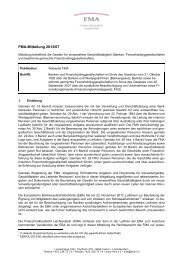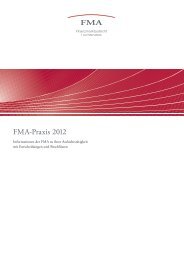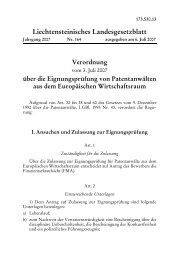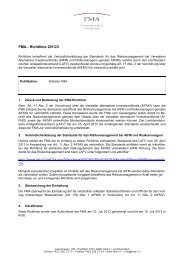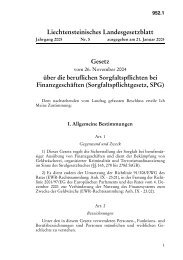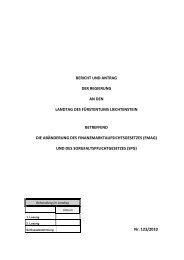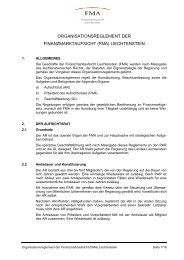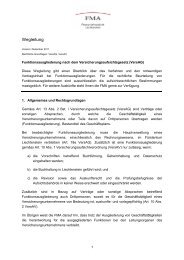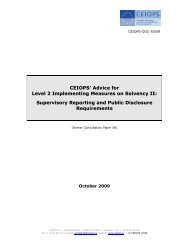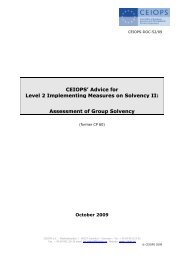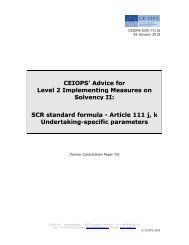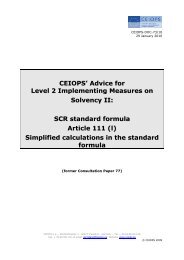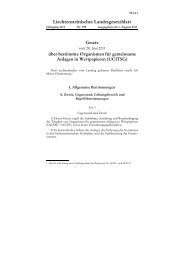Liechtenstein Law Gazette
Liechtenstein Law Gazette
Liechtenstein Law Gazette
You also want an ePaper? Increase the reach of your titles
YUMPU automatically turns print PDFs into web optimized ePapers that Google loves.
<strong>Liechtenstein</strong> <strong>Law</strong> <strong>Gazette</strong><br />
Year 2005 No. 5 published on 21 January 2005<br />
<strong>Law</strong><br />
of 26 November 2004<br />
on Professional Due Diligence in Financial<br />
Transactions (Due Diligence Act, DDA)<br />
952.1<br />
I hereby grant My consent to the following resolution adopted by<br />
Parliament:<br />
I. General Provisions<br />
Article 1<br />
Object and purpose<br />
1) This Act governs the application of due diligence in professional<br />
financial transactions and serves to combat money laundering, organized<br />
crime, and the financing of terrorism within the meaning of the Criminal<br />
Code (§§165, 278 to 278d StGB).<br />
2) It also serves to implement Directive 91/308/EEC of the Council<br />
(EEA Compendium of <strong>Law</strong>s: Annex IX – 23.01), in the version of Directive<br />
2001/97/EC of the European Parliament and the Council of 4 December 2001<br />
on prevention of the use of the financial system for money laundering (EEA<br />
Compendium of <strong>Law</strong>s: Annex IX – 23.02).<br />
Article 2<br />
Designations<br />
The designations used in this Act to denote persons, functions and<br />
professions include persons of male and female gender alike.
952.1 Due Diligence Act (DDA)<br />
Article 3<br />
Personal scope of application<br />
1) This Act shall apply to the following legal and natural persons<br />
(persons subject to due diligence):<br />
a) banks and finance companies holding a license pursuant to the<br />
Banking Act, e-money institutions holding a license pursuant to the<br />
E-Money Act, as well as <strong>Liechtenstein</strong> branches of foreign banks,<br />
finance companies, and emoney institutions;<br />
b) asset management companies holding a license pursuant to the Asset<br />
Management Act and <strong>Liechtenstein</strong> branches or establishments of<br />
foreign securities firms; 1<br />
c) investment undertakings holding a license pursuant to the Investment<br />
Undertakings Act; 2<br />
d) insurance undertakings holding a license pursuant to the Insurance<br />
Supervision Act which offer direct life insurance, as well as<br />
equivalent <strong>Liechtenstein</strong> branches of foreign insurance undertakings;<br />
e) the <strong>Liechtenstein</strong> Postal Services (limited company);<br />
f) casinos;<br />
g) natural and legal persons holding a license pursuant to the<br />
Professional Trustees Act;<br />
h) natural persons holding a confirmation pursuant to article 180a PGR2;<br />
i) exchange offices;<br />
k) lawyers registered in the Lists of <strong>Law</strong>yers in accordance with the<br />
<strong>Law</strong>yers Act, and legal agents within the meaning of article 67 of the<br />
<strong>Law</strong>yers Act;<br />
l) natural and legal persons holding a license pursuant to the <strong>Law</strong> on<br />
Auditors and Auditing Companies as well as auditing offices subject<br />
to spezial legislation legislation;<br />
m) real estate agents;<br />
1 Article 3, Paragraph 1 (b) amended by <strong>Liechtenstein</strong> <strong>Law</strong> <strong>Gazette</strong> LGBl. 2005 No. 281.<br />
2 Article 3, Paragraph 1 (c) amended by <strong>Liechtenstein</strong> <strong>Law</strong> <strong>Gazette</strong> LGBl. 2005 No. 281.<br />
2
952.1 Due Diligence Act (DDA)<br />
n) dealers in high-value goods and auctioneers.<br />
o) insurance brokers holding a license pursuant to the Insurance<br />
Mediation Act for the mediation of life insurance policies and other<br />
services for the purpose of investment. 1<br />
2) Legal and natural persons that do not fall within the scope of<br />
paragraph 1 are nevertheless subject to due diligence if they carry out<br />
financial transactions on a professional basis.<br />
3) Occupational pension institutions that are exempt from taxation<br />
shall be exempt from the scope of this Act.<br />
4) Persons subject to due diligence pursuant to paragraph 1,<br />
subparagraph i, m, and n as well as paragraph 2 shall inform the responsible<br />
authority (article 23) immediately upon assumption of their business activity.<br />
Article 4<br />
Substantive scope of application<br />
1) This Act shall apply to the professional conduct of financial transactions.<br />
2) The following transactions shall be considered financial transactions:<br />
a) every acceptance or safekeeping of the assets of third parties, as well<br />
as assistance in the acceptance, investment, or transfer of such assets;<br />
or<br />
b) establishing a legal entity on the account of a third party that does not<br />
operate commercially in the domiciliary State or acting as an organ of<br />
such a legal entity. A legal entity that does not operate commercially<br />
in the domiciliary State is, in particular, a legal person, company,<br />
trust, or other association or asset entity – regardless of its legal<br />
structure – that does not conduct any trade, manufacturing, or other<br />
commercial operation in the domiciliary State. This provision is<br />
without prejudice to paragraph 3, subparagraph d.<br />
3) The following transactions shall not be considered financial<br />
transactions:<br />
a) contractual relations of an investment undertaking that neither keeps<br />
share accounts nor offers or distributes shares itself;<br />
b) contractual relations in the form of an exclusive asset management<br />
1 Article 3, Paragraph 1 (o) amended by <strong>Liechtenstein</strong> <strong>Law</strong> <strong>Gazette</strong> LGBl. 2006 No. 129.<br />
3
952.1 Due Diligence Act (DDA)<br />
mandate with limited power of attorney for a bank account or bank<br />
deposit for an individual client that is maintained at a bank subject to<br />
Directive 91/308/EEC in the version of Directive 2001/97/EC or<br />
similar regulation and appropriate supervision. A power of attorney<br />
for asset management is considered limited if, in particular, the<br />
powers to make direct investments and to debit and balance the<br />
account or deposit – except for the collection of reasonable<br />
administrative fees – have been cumulatively excluded by the<br />
empowering person. 1<br />
c) business relationships of lawyers and legal agents, unless the lawyer<br />
or legal agent contributes to the planning and execution of financial or<br />
real estate transactions for his client, beyond forensic activities, with<br />
respect to the following:<br />
1 the purchase and sale of enterprises or foreign real estate; 2<br />
2 the management of money, securities, or other assets of the client;<br />
3 the opening or management of accounts, deposits, or safe deposit<br />
boxes;<br />
4 the obtaining of the means necessary for the formation, operation,<br />
or management of legal persons, companies, trusts, or other<br />
associations or asset entities; or<br />
5 the establishment on the account of a third party of a legal entity<br />
that does not operate commercially in the domiciliary State,<br />
within the meaning of paragraph 2, subparagraph b, or the<br />
performance of activities as an organ of such a legal entity. This<br />
provision is without prejudice to subparagraph d; or<br />
d) the establishment of a holding company on the account of a third<br />
party or the performance of activities as an organ of such a holding<br />
company, in both cases to the extent that the holding company serves<br />
as an instrument to form an operational group.<br />
e) transactions of real estate brokers, to the extent that they arise from<br />
the purchase or sale of property in <strong>Liechtenstein</strong> real estate.<br />
4) The following transactions are equivalent to financial transactions:<br />
a) transactions by dealers in high-value goods and by auctioneers if<br />
payment is made in cash and the amount exceeds 25,000 Swiss<br />
1 Article 4, Paragraph 3 (b) (1) amended by <strong>Liechtenstein</strong> <strong>Law</strong> <strong>Gazette</strong> LGBl. 2006 No. 129.<br />
2 Article 4, Paragraph 3 (e) inserted by <strong>Liechtenstein</strong> <strong>Law</strong> <strong>Gazette</strong> LGBl. 2006 No.129.<br />
4
952.1 Due Diligence Act (DDA)<br />
francs, regardless of whether the transaction is made in a single step<br />
or in several steps that obviously appear to be linked; or<br />
b) the granting of admission to a casino to visitors, regardless of whether<br />
the visitor actually takes part in gaming activities or buys or sells<br />
gaming tokens.<br />
it<br />
5) Wherever the expression "business relationship" is used in this Act,<br />
refers to a financial transaction or to a transaction equivalent to a financial<br />
transaction within the meaning of this article.<br />
5
952.1 Due Diligence Act (DDA)<br />
II. Due Diligence in Financial Transactions<br />
A. Identification of the Contracting Party and of the Beneficial<br />
Owner<br />
Article 5<br />
Identification of the contracting party<br />
The persons subject to due diligence are required to identify their<br />
contracting parties by means of documentation with probative value when<br />
entering into a business relationship.<br />
Article 6<br />
Exceptions to the identification obligation<br />
1) There shall be no obligation to identify the contracting party<br />
pursuant to article 5 if:<br />
a) a spot transaction is made that does not exceed the maximum amount<br />
of 25,000 Swiss francs, regardless of whether the transaction is made<br />
in a single step or in several steps that obviously appear to be linked;<br />
b) remittances or transfers are made which do not exceed the maximum<br />
amount of 5,000 Swiss francs, regardless of whether the transaction is<br />
made in a single step or in several steps which obviously appear to be<br />
linked;<br />
c) the amount of a periodic insurance premium is less than 1,500 Swiss<br />
francs per year;<br />
d) a one-time insurance premium is less than 4,000 Swiss francs, or less<br />
than 4,000 Swiss francs is paid into a premium deposit;<br />
e) the account in question is a rental deposit account for rental property<br />
located in an EEA member State or in Switzerland;<br />
f) the account in question is an account for payment under subscription<br />
of capital during formation or for increase in capital of a legal person<br />
or partnership to be entered or already entered in the Public Register;<br />
g) the contracting party is a legal person admitted to official quotation at<br />
a stock exchange;<br />
6
952.1 Due Diligence Act (DDA)<br />
h) the contracting party has already been identified in an equivalent way<br />
within the same group or enterprise. In that case, copies of the<br />
documents used for the original identification shall be included with<br />
the due diligence files; or<br />
i) an application for insurance has been accepted by a person subject to<br />
due diligence which has already identified the contracting party in<br />
connection with other financial transactions. In that case, the person<br />
subject to due diligence shall include copies of the documents used<br />
for the original identification with the due diligence files.<br />
2) If the obligation to identify the contracting party has not already<br />
been waived pursuant to paragraph 1, subparagraph c or d, it shall waived in<br />
connection with transactions of the same kind if it is established that the<br />
payment is to be handled through an account that was opened in the name of<br />
the contracting party with a bank or postal institution that is domiciled in an<br />
EEA member State or in Switzerland in accordance with article 5 or an<br />
equivalent foreign legal provision.<br />
3) If suspicion arises that assets may be connected with offenses<br />
enumerated in article 16, paragraph 1, the contracting party must be<br />
identified regardless of the exceptions contained in paragraph 1 and<br />
paragraph 2. This provision shall not apply if the person subject to due<br />
diligence refrains from entering into a business relationship.<br />
Article 7<br />
Identification of the beneficial owner<br />
1) When entering into a business relationship, the persons subject to<br />
due diligence must identify the beneficial owner with care that is appropriate<br />
to the circumstances. In doing so, they may start from the assumption that the<br />
contracting party is identical to the beneficial owner. If, however, doubts<br />
arise whether this assumption is correct, the person subject to due diligence<br />
must require from the contracting party a written statement identifying the<br />
beneficial owner.<br />
2) The person subject to due diligence shall always require a written<br />
statement by the contracting party identifying the beneficial owner if:<br />
a) a spot or insurance transaction or a remittance or transfer is made that<br />
exceeds the maximum amount stated in article 6, paragraph 1;<br />
b) the business relationship is initiated with a natural person by<br />
correspondence; or<br />
7
952.1 Due Diligence Act (DDA)<br />
c) the contracting party is a legal entity that does not operate<br />
commercially in<br />
the domiciliary State within the meaning of article 4, paragraph 2,<br />
subparagraph b.<br />
Article 8<br />
Exceptions to the identification obligation<br />
1) There is no obligation to identify the beneficial owner:<br />
a) in the cases of article 6, paragraph 1, subparagraphs a to f and in the<br />
case of article 6, paragraph 2;<br />
b) if the beneficial owner is a legal entity that does not operate<br />
commercially in the domiciliary State within the meaning of article 4,<br />
paragraph 2, subparagraph b and that is admitted to official quotation<br />
at a stock exchange;<br />
c) for banks and postal institutions, in the case of accounts or deposits<br />
maintained in the name of lawyers admitted in an EEA member State<br />
or in Switzerland on the account of their clients in the course of<br />
forensic activity or in their capacity as executors, escrow agents, or in<br />
a similar capacity. The Government shall regulate the preconditions<br />
by ordinance.<br />
d) for institutional persons subject to due diligence, namely a bank, a<br />
postal institution, an investment undertaking, or an insurance<br />
undertaking, if the contracting party is either another institution of<br />
that kind domiciled in <strong>Liechtenstein</strong> or abroad or a securities trader<br />
subject to Directive 91/308/EEC in the version of Directive<br />
2001/97/EC or an equivalent regulation and subject to appropriate<br />
supervision; or<br />
e) if the contracting party is an occupational pension institution that is<br />
exempt from taxation.<br />
2) Notwithstanding paragraph 1, the obligation to identify the<br />
beneficial owner is eased for all persons subject to due diligence if the<br />
contracting party is the representative of a collective form of investment or<br />
an associated company with more than twenty beneficial owners as investors.<br />
In that case, only the beneficial owners who alone or in joint agreement are<br />
entitled to at least 5% of the contributed assets must be established. If the<br />
number of beneficial owners does not exceed twenty, all beneficial owners<br />
8
952.1 Due Diligence Act (DDA)<br />
must be identified. The obligation to identify the beneficial owners shall be<br />
waived entirely in the case of collective forms of investment admitted to<br />
official quotation at a stock exchange.<br />
Article 9<br />
Repetition of identification<br />
1) The persons subject to due diligence must repeat the identification<br />
of the contracting party or of the beneficial owner if any doubts arise<br />
concerning the identity of the contracting party or the beneficial owner in the<br />
course of the business relationship.<br />
2) The persons subject to due diligence may discontinue the business<br />
relationship if doubts about the information supplied by the contracting party<br />
persist despite a repetition of identification.<br />
3) The persons subject to due diligence shall be prohibited from<br />
discontinuing the business relationship if the preconditions are met for the<br />
reporting obligation pursuant to article 16, paragraph 1.<br />
Article 10<br />
Correspondent banking relations<br />
The Government may by ordinance issue more stringent due diligence<br />
obligations for banks and postal institutions that carry out correspondent<br />
banking services for foreign banks and postal institutions with respect to such<br />
business relationships.<br />
Article 11<br />
Statement of originator for electronic payment orders<br />
In the case of electronic payment orders, banks and postal institutions<br />
must provide sufficient information about the contracting party originating<br />
the order.<br />
Article 12<br />
Prohibition of initiation of a business relationship<br />
1) Banks and postal institutions may not engage in business<br />
relationships with shell banks. Shell banks are banks that do not maintain any<br />
9
952.1 Due Diligence Act (DDA)<br />
physical presence in the domiciliary State and are not part of a group that<br />
works in the financial industry, that is adequately monitored in a consolidated<br />
way, and that is subject to Directive 91/308/EEC in the version of Directive<br />
2001/97/EC or an equivalent regulation.<br />
2) Banks and postal institutions may not engage in business<br />
relationships with banks or postal institutions that permit shell banks to use<br />
their accounts, deposits, or safe deposit boxes.<br />
3) Banks and postal institutions may not maintain passbooks,<br />
accounts, or deposits payable to bearer.<br />
4) Banks and postal institutions may not maintain any anonymous<br />
accounts, passbooks, or deposits or accounts, passbooks, or deposits under a<br />
fictitious name. 1<br />
1 Article 12, Paragraph 4 inserted by <strong>Liechtenstein</strong> <strong>Law</strong> <strong>Gazette</strong> LGBl. 2006 No. 129.<br />
10
952.1 Due Diligence Act (DDA)<br />
B. Monitoring<br />
Article 13<br />
Basic principle<br />
1) The persons subject to due diligence must ensure that their longterm<br />
business relationships are monitored in a way adequate to the risks<br />
involved.<br />
2) For this purpose, they must establish criteria indicating higher risks<br />
and issue internal instructions on how such risks are to be limited and<br />
monitored. The FMA may issue certain binding risk criteria in a guideline.<br />
3) Banks with branches abroad or that lead a financial group with<br />
foreign companies must, at a global level, assess, limit, and monitor their<br />
risks connected with money laundering, organized crime, and the financing<br />
of terrorism.<br />
Article 14<br />
Profile<br />
The persons subject to due diligence must compile and keep updated<br />
a profile for each long-term business relationship. The Government shall<br />
regulate the requirements by ordinance.<br />
Article 15<br />
Inquiries<br />
1) The persons subject to due diligence must carry out simple<br />
inquiries with appropriate effort if, in the context of long-term business<br />
relationships, circumstances or transactions arise which deviate from the<br />
profile or which meet the risk criteria established by the person subject to due<br />
diligence pursuant to article 13, paragraph 2.<br />
2) The persons subject to due diligence must carry out special<br />
inquiries if, in the context of long-term business relationships, circumstances<br />
or transactions arise which give rise to the suspicion that assets might be<br />
connected with criminal offenses enumerated in article 16, paragraph 1.<br />
11<br />
3) The results of the inquiries must be documented in the due
952.1 Due Diligence Act (DDA)<br />
diligence files.<br />
C. Reporting obligation<br />
Article 16<br />
Obligation to report to the FIU<br />
1) If, as a result of inquiries within the meaning of article 15 or in<br />
connection with short-term business relationships by other means, the<br />
suspicion arises that a connection with money laundering, a predicate offense<br />
of money laundering, organized crime, or the financing of terrorism exists,<br />
the persons subject to due diligence must immediately submit a report in<br />
writing to the Financial Intelligence Unit (FIU). Likewise, all offices of the<br />
National Administration as well as the responsible authority (article 23) shall<br />
be subject to the obligation to report to the FIU.<br />
2) Until the conclusion of special inquiries within the meaning of<br />
article 15, paragraph 2, or if the preconditions for the reporting obligation<br />
apply, the persons subject to due diligence may not discontinue the business<br />
relationship.<br />
3) If a person has submitted a report pursuant to paragraph 1 to the<br />
FIU and the report turns out to have been unjustified, such person shall be<br />
free of any liability under civil or criminal law, unless the person was acting<br />
intentionally. In the same way, there shall be no civil liability for persons not<br />
discontinuing a business relationship in accordance with paragraph 2 even<br />
though the contracting party expressly wishes a discontinuation or<br />
termination of the business relationship.<br />
4) Until an order from the responsible prosecution authority arrives,<br />
but at most until the conclusion of five business days from receipt by the FIU<br />
of the report pursuant to paragraph 1, the persons subject to due diligence<br />
shall refrain from all actions that might obstruct or interfere with any orders<br />
pursuant to §97a StPO, unless such actions have been approved in writing by<br />
the FIU.<br />
12
952.1 Due Diligence Act (DDA)<br />
5) Until an order from the responsible prosecution authority arrives,<br />
but at most until the conclusion of twenty business days from receipt by the<br />
FIU of the report pursuant to paragraph 1, the persons subject to due<br />
diligence may not inform the contracting party, the beneficial owner, or third<br />
parties that they have submitted a report to the FIU.<br />
6) <strong>Law</strong>yers and legal agents as well as auditors, auditing companies,<br />
and auditing offices subject to special legislation are not required to submit a<br />
report to the FIU if they have received the information from or through a<br />
client in the course of assessing the legal situation for such client, or if they<br />
have received the information in the course of their activity as defense<br />
attorney or representative of that client in or concerning court proceedings,<br />
including advice on the pursuit or prevention of proceedings, before or after<br />
such proceedings, or during such proceedings.<br />
Article 17<br />
Right to report to the FIU<br />
1) If, in connection with preparations for a business relationship, but<br />
without one actually being entered into, the suspicion arises that a connection<br />
with money laundering, a predicate offense of money laundering, organized<br />
crime, or the financing of terrorism exists, the persons subject to due<br />
diligence may submit a report in writing to the FIU.<br />
2) Article 16, paragraphs 3 and 5 shall apply mutatis mutandis.<br />
D. Joint Provisions<br />
Article 18<br />
Delegation<br />
1) The persons subject to due diligence may have the identification of<br />
the contracting party and of the beneficial owner, the compilation of the<br />
profile, and the ongoing monitoring of the business relationship – with the<br />
exception of the obligations pursuant to article 16, paragraph 1 – carried out<br />
by:<br />
a) another person subject to due diligence or a natural or legal person<br />
abroad subject to Directive 91/308/EEC in the version of Directive<br />
2001/97/EC or an equivalent regulation and subject to appropriate<br />
supervision, as long as compliance with the obligations pursuant to<br />
13
952.1 Due Diligence Act (DDA)<br />
this Act is objectively ensured; or<br />
b) a mandated third party.<br />
2) In the event of delegation, the persons subject to due diligence<br />
shall remain responsible for compliance with the due diligence obligations.<br />
This provision is without prejudice to article 30, paragraph 2.<br />
Article 19<br />
Rendering of joint services<br />
1) If several persons subject to due diligence render services to the<br />
same contracting party using joint billing and the same firm name, it shall<br />
suffice if the person subject to due diligence responsible for the mandate<br />
identifies the contracting party and the beneficial owner, compiles the profile,<br />
and undertakes ongoing monitoring, provided that the financial transaction is<br />
the same. This shall also apply if several persons subject to due diligence<br />
using joint billing and the same firm name operate as organs of the same<br />
legal entity that does not operate commercially in the domiciliary State<br />
within the meaning of article 4, paragraph 2, subparagraph b.<br />
2) If several persons subject to due diligence which do not use joint<br />
billing and the same firm name operate as organs of the same legal entity that<br />
does not operate commercially in the domiciliary State within the meaning of<br />
article 4, paragraph 2, subparagraph b, it shall be permissible to have the<br />
obligations enumerated in paragraph 1 carried out by one of these organs.<br />
The persons subject to due diligence which do not personally carry out these<br />
obligations nevertheless remain responsible for compliance with the<br />
obligations. This provision is without prejudice to article 30, paragraph 3.<br />
3) Persons subject to due diligence that do not personally carry out<br />
the obligations enumerated in paragraph 1 must ensure that they are granted<br />
access to the due diligence files on request at any time.<br />
14
952.1 Due Diligence Act (DDA)<br />
III. Documentation and Internal Organization<br />
Article 20<br />
Documentation obligation<br />
1) The persons subject to due diligence must document their<br />
compliance with the due diligence obligations in their business relationships<br />
in accordance with this Act. For that purpose, they must keep and maintain<br />
due diligence files for their business relationship. Client-related records and<br />
receipts shall be kept for at least ten years from the end of the business<br />
relationship; transaction-related records and receipts, on the other hand, for at<br />
least ten years from the conclusion of the transaction or from their<br />
preparation. The Government shall regulate the specifics by ordinance. 1<br />
2) In cases for which, according to article 6, paragraph 1 or 2, there is<br />
no obligation to identify the contracting party, the name of the contracting<br />
party and the reason why there is no such obligation must be evident from the<br />
due diligence files. This provision shall not apply to spot transactions in<br />
accordance with article 6, paragraph 1, subparagraph a or remittances or<br />
transfers in accordance with article 6, paragraph 1, subparagraph b.<br />
3) In cases for which, according to article 8, there is no obligation to<br />
identify the beneficial owner, the reason why there is no such obligation must<br />
also be evident from the due diligence files, except in the case of article 8,<br />
paragraph 1, subparagraph d. 2<br />
Article 21<br />
Internal organization<br />
1) The persons subject to due diligence must take the necessary<br />
organizational measures and ensure suitable internal instruments of<br />
inspection and monitoring. They shall in particular issue internal instructions<br />
and ensure the basic and continuing training of their staff.<br />
2) As appropriate to the circumstances, the internal organization must<br />
be structured according to the type and size of the enterprise as well as<br />
according to the number, type, and complexity of the business relationships.<br />
1 Article 20, Paragraph 1 amended by <strong>Liechtenstein</strong> <strong>Law</strong> <strong>Gazette</strong> LGBl. 2006 No. 129.<br />
2 Article 20, Paragraph 2 amended by <strong>Liechtenstein</strong> <strong>Law</strong> <strong>Gazette</strong> LGBl. 2006 No. 129.<br />
15
952.1 Due Diligence Act (DDA)<br />
The effective fulfillment of the internal functions and due diligence<br />
obligations must be ensured at all times.<br />
3) The persons subject to due diligence must prepare an internal<br />
annual report in which an overview is given of the measures that have been<br />
taken to implement this Act during the preceding calendar year.<br />
Article 22<br />
Internal functions<br />
1) The persons subject to due diligence must appoint a contact person<br />
for the responsible authority (article 23) as well as persons or expert bodies<br />
for the internal functions of compliance officers and investigating officers.<br />
2) Substitution must be ensured at all times.<br />
3) One person or, if applicable, one expert body may carry out several<br />
functions, provided that the implementation of this Act is ensured.<br />
IV. Supervision<br />
A. Executing Authority<br />
Article 23<br />
Competence<br />
The Financial Market Authority (FMA) shall supervise the execution<br />
of this Act, without prejudice to the powers of the FIU.<br />
16
952.1 Due Diligence Act (DDA)<br />
B. Inspections<br />
Article 24<br />
Ordinary inspections<br />
1) The FMA shall carry out ordinary inspections on a regular, spotcheck<br />
basis with respect to compliance with the provisions of this Act, or it<br />
shall have such inspections carried out.<br />
2) The frequency and intensity of inspections shall depend on the<br />
type, scope, complexity, and risk level of the business activities undertaken<br />
by the persons subject to due diligence.<br />
3) The inspections shall encompass both formal inspection<br />
concerning compliance with the documentation obligation as well as material<br />
inspection concerning the plausibility of the due diligence measures taken.<br />
4) A report shall be drawn up in each case about the results of the<br />
inspections.<br />
5) If an auditing office subject to special legislation is at the disposal<br />
of the persons subject to due diligence, their compliance with the provisions<br />
of this Act shall as a rule be verified by that auditing office at the request of<br />
the FMA or by the FMA itself.<br />
6) All other persons subject to due diligence shall be inspected by the<br />
FMA or at the request of the FMA by auditors or auditing companies with<br />
respect to compliance with the provisions of this Act. The aforementioned<br />
persons subject to due diligence may submit two proposals for auditors or<br />
auditing companies stating their preference. The FMA shall as a rule mandate<br />
the preferred auditor or auditing company.<br />
7) The records and data of the inspection must be processed and<br />
stored exclusively in <strong>Liechtenstein</strong>.<br />
8) The findings obtained in the course of the inspections may be used<br />
for the sole purpose of combating money laundering, predicate offenses of<br />
money laundering, organized crime, and the financing of terrorism within the<br />
meaning of the Criminal Code. This provision is without prejudice to article<br />
34.<br />
9) The costs for the inspection activities and the associated<br />
administrative costs for purposes of this Act shall be borne by the inspected<br />
persons subject to due diligence.<br />
17
952.1 Due Diligence Act (DDA)<br />
Article 25<br />
Extraordinary inspections<br />
Article 24 shall apply mutatis mutandis to extraordinary inspections<br />
(article 28, paragraph 1, subparagraph c).<br />
C. Mandated Auditors, Auditing Companies, and Auditing<br />
Offices subject to Special<br />
Legislation<br />
Article 26<br />
Preconditions<br />
Unless the inspections are carried out by the FMA itself, only<br />
auditors, auditing companies, and auditing offices subject to special<br />
legislation may be mandated which:<br />
a) hold a license under the <strong>Law</strong> on Auditors and Auditing Companies or<br />
a license as an auditing office pursuant to special legislation;<br />
b) are independent from the persons subject to due diligence to be<br />
audited; and<br />
c) provide proof of regular participation in external basic and continuing<br />
training.<br />
Article 27<br />
Obligations<br />
By accepting the mandate, the auditor, auditing companies, or<br />
auditing office subject to special legislation commit themselves to:<br />
a) comply with the basic principles determined by the FMA on<br />
inspection activities;<br />
b) report to the FMA on their inspection activities. No significant facts<br />
may be withheld from the report. The information given in the report<br />
must be true;<br />
c) keep silent about the findings of their inspection activities. Within the<br />
scope of their activities pursuant to this Act, they shall be subject to<br />
official secrecy. This provision is without prejudice to subparagraph b<br />
18
952.1 Due Diligence Act (DDA)<br />
and article 28, paragraph 3; and<br />
d) process and store the records and data of the inspections exclusively<br />
in <strong>Liechtenstein</strong>.<br />
D. Measures<br />
Article 28<br />
Supervisory measures<br />
1) The FMA shall take the necessary measures in the framework of its<br />
supervision of the persons subject to due diligence. It may in particular:<br />
a) issue orders, guidelines, and recommendations;<br />
b) carry out ordinary inspections within the meaning of article 24 or<br />
have them carried out;<br />
c) carry out extraordinary inspections or have them carried out if there<br />
are indications for doubts as to fulfillment of due diligence<br />
obligations or if circumstances exist that appear to endanger the<br />
reputation of the financial center;<br />
d) as a result of repeated or grave violations of individual provisions of<br />
this Act and to prevent further violations, prohibit the initiation of<br />
new business relationships for a limited period of time;<br />
e) request the responsible authority to undertake appropriate disciplinary<br />
measures. The disciplinary authority shall periodically inform the<br />
FMA on the status of the ongoing proceedings.<br />
2) The FMA shall inform the persons subject to due diligence on its<br />
practice.<br />
3) The FMA may demand from the persons subject to due diligence<br />
as well as from those mandated to inspect pursuant to article 24, paragraph 5<br />
or 6 all information and records it requires to fulfill its supervisory activities<br />
for the purposes of this Act.<br />
19<br />
E. Legal Remedies<br />
Article 29<br />
Administrative appeal
952.1 Due Diligence Act (DDA)<br />
1) Decisions and orders by the FMA shall be subject to appeal to the<br />
FMA Complaints Commission within 14 days from service.<br />
2) Decisions and orders by the FMA Complaints Commission shall be<br />
subject to appeal to the Administrative Court within 14 days from service.<br />
V. Penal Provisions, Administrative Measures, Business<br />
Measures, and<br />
Administrative Assistance<br />
A. Penal Provisions<br />
Article 30<br />
Criminal offenses<br />
1) The Court of Justice shall punish anyone with imprisonment of up<br />
to six months or with a fine of up to 360 daily rates who intentionally:<br />
a) fails to identify the contracting party pursuant to article 5;<br />
b) fails to identify the beneficial owner pursuant to article 7;<br />
c) fails to repeat the identification of the contracting party and of the<br />
beneficial owner pursuant to article 9, paragraph 1;<br />
d) conducts a business relationship in violation of article 12, paragraph<br />
1, 2, or 4; 1<br />
e) as a bank or postal institution, opens passbooks, accounts, or deposits<br />
payable to bearer in violation of article 12, paragraph 3 or fails to<br />
dissolve existing contractual relationships within the meaning of<br />
article 12, paragraph 3 in accordance with the requirements of article<br />
40, paragraph 4;<br />
f) fails to undertake necessary special inquiries, in violation of article<br />
15, paragraph 2;<br />
g) fails to submit a report to the FIU pursuant to article 16, paragraph 1;<br />
h) discontinues a business relationship in violation of article 16,<br />
paragraph 2;<br />
i) fails to refrain from actions specified in article 16, paragraph 4 that<br />
1 Article 30, Paragraph 1 (d) amended by <strong>Liechtenstein</strong> <strong>Law</strong> <strong>Gazette</strong> LGBl. 2006 No. 129.<br />
20
952.1 Due Diligence Act (DDA)<br />
might obstruct or interfere with any orders pursuant to §97a StPO,<br />
without such actions having been approved by the FIU;<br />
k) violates the obligation not to disclose information specified in article<br />
16, paragraph 5;<br />
l) fails to create or keep due diligence files required by article 20,<br />
paragraph 1;<br />
m) as an auditor, auditing company, or auditing office subject to special<br />
legislation, commits a gross violation of the obligations contained in<br />
article 27, subparagraph b, especially by making incorrect statements<br />
in the audit report or by withholding significant facts;<br />
n) as an auditor, auditing company, or auditing office subject to special<br />
legislation, violates the obligation of secrecy required by article 27,<br />
subparagraph c;<br />
o) as an auditor, auditing company, or auditing office subject to special<br />
legislation, processes or stores inspection records and data outside<br />
<strong>Liechtenstein</strong>, in violation of article 27, subparagraph d;<br />
p) fails to have the inspections pursuant to article 28, paragraph 1,<br />
subparagraph b or c carried out at all or with respect to individual<br />
areas of the due diligence obligations.<br />
2) A person shall not be punished pursuant to paragraph 1,<br />
subparagraphs a, b, c, or f who transferred the corresponding obligations by<br />
written agreement to a delegate pursuant to article 18, paragraph 1,<br />
subparagraph a, provided that the person, with the degree of care required by<br />
the circumstances:<br />
a) selected the delegate;<br />
b) instructed the delegate on the delegate's responsibilities; and<br />
c) verified proper fulfillment of responsibilities by the delegate.<br />
3) A person shall likewise not be punished pursuant to paragraph 1,<br />
subparagraphs a, b, c, or f who does not personally fulfill the corresponding<br />
obligations, in accordance with the preconditions of article 19, paragraph 1 or<br />
2, if the person:<br />
a) has by written agreement determined an person subject to due<br />
diligence to fulfill such obligations; and<br />
b) appropriately verifies proper fulfillment of the obligations.<br />
21
952.1 Due Diligence Act (DDA)<br />
Article 31<br />
Administrative offenses<br />
1) The FMA shall punish by a fine of up to 100,000 Swiss francs for<br />
committing an administrative offense anyone who:<br />
a) refuses to give information, makes incorrect statements, or withholds<br />
significant facts vis-à-vis the FMA, an auditor, an auditing company,<br />
or an auditing office subject to special legislation;<br />
b) fails to comply with an order to restore the lawful state or any other<br />
order issued by the FMA in the course of enforcing this Act;<br />
c) permits the outflow of assets, in violation of article 35.<br />
2) Anyone who fails to submit a report in accordance with article 3,<br />
paragraph 4 or article 40, paragraph 2 shall be punished by the FMA for<br />
committing an administrative offense with a fine of up to 10,000 Swiss<br />
francs.<br />
22
952.1 Due Diligence Act (DDA)<br />
Article 32<br />
Applicability of other criminal law provisions<br />
The provisions of this Act are without prejudice to criminal liability<br />
arising from other criminal law provisions.<br />
Article 33<br />
Responsibility<br />
If the violations are committed in the course of the business<br />
operations of a legal person or a trust, the penal provisions shall apply to the<br />
persons who acted or should have acted on behalf of such legal person or<br />
trust; the legal person or the trust fund shall, however, be jointly and<br />
severally liable for criminal fines, administrative fines, and costs.<br />
B. Administrative Measures<br />
Article 34<br />
Reservation of additional measures<br />
The provisions of this Act are without prejudice to additional<br />
measures against the persons subject to due diligence, the auditing offices of<br />
banks and finance companies, of investment undertakings and of insurance<br />
undertakings, as well as against auditors and auditing companies, in<br />
accordance with the relevant special legislation.<br />
C. Business-related Measures<br />
Article 35<br />
Lack of disclosure<br />
1) If persons subject to due diligence still maintain accounts or<br />
deposits in the context of business relationships which were opened before 1<br />
January 2001 and which under law applicable at the time did not require a<br />
profile of the business relationship including the beneficial owner, they may<br />
not permit any outflow of assets as long as the requisite information and<br />
records are not available.<br />
23<br />
2) The outflow of assets shall be permissible on an exceptional basis
952.1 Due Diligence Act (DDA)<br />
if:<br />
a) the balance of assets of the business relationship does not exceed<br />
25,000 Swiss francs;<br />
b) no suspicion of connection with money laundering, predicate offenses<br />
of money laundering, organized crime, or the financing of terrorism<br />
exists;<br />
c) the name of the person to whom the assets are to be transferred is<br />
evident from the due diligence files;<br />
d) the assets are transferred in a way that allows the authorities to trace<br />
them;<br />
e) the business relationship is immediately terminated once the assets<br />
have been transferred.<br />
D. Administrative Assistance<br />
Article 36<br />
Cooperation between domestic authorities<br />
1) The <strong>Liechtenstein</strong> authorities, in particular the courts, the Office of<br />
the Public Prosecutor, the FMA, the FIU, the National Police, and other<br />
authorities responsible for combating money laundering, organized crime,<br />
and the financing of terrorism are required to provide all information and<br />
transmit all records to each other that are necessary for the enforcement of<br />
this Act.<br />
2) In criminal proceedings relating to §§165, 278 to 278d StGB, the<br />
Office of the Public Prosecutor shall inform the FMA and the FIU whenever<br />
such proceedings are initiated and discontinued, and the courts shall transmit<br />
copies of any judgments rendered in such proceedings. In addition, the<br />
persons subject to due diligence that have submitted a report pursuant to<br />
article 16, paragraph 1 shall be informed of the outcome of the corresponding<br />
proceedings.<br />
3) In addition, the Office of the Public Prosecutor shall inform the<br />
FMA on the initiation and discontinuation of proceedings in connection with<br />
article 30, and the courts shall transfer copies of any judgments rendered in<br />
such proceedings.<br />
24<br />
Article 37
952.1 Due Diligence Act (DDA)<br />
Cooperation with foreign authorities<br />
1) The following provisions shall apply to the extent that cooperation<br />
with foreign authorities is not regulated by special legislation.<br />
2) In order to fulfill its responsibilities, the FMA may request foreign<br />
authorities to provide information or transmit records if necessary according<br />
for the purposes of this Act.<br />
3) The FMA may only provide official information that is not<br />
available to the public to foreign financial supervisory authorities if:<br />
a) doing so does not violate public order, other significant national<br />
interests, secrecy provisions, or fiscal interests;<br />
b) the information is in accordance with the purposes of this Act;<br />
c) it is ensured that the requesting State would comply with a request of<br />
the same kind made by <strong>Liechtenstein</strong>:<br />
d) it is ensured that the information provided will only be used for<br />
verifying compliance with due diligence obligations;<br />
e) it is ensured that the staff members of the responsible authorities as<br />
well as any persons authorized by the responsible authorities are<br />
subject to official or professional secrecy;<br />
f) the <strong>Law</strong> on International Mutual Legal Assistance in Criminal<br />
Matters does not apply; and<br />
g) it is ensured that the information provided will not be forwarded to<br />
other authorities or bodies without prior consent of the FMA. If the<br />
information originates from a foreign authority, the information may<br />
only be forwarded with the express consent of the foreign authority,<br />
and, if applicable, only for the purpose to which such authority has<br />
given its consent.<br />
4) For the purposes of this article, financial supervisory authorities are<br />
authorities responsible for verifying compliance with due diligence<br />
obligations in financial transactions.<br />
5) Information pursuant to paragraph 3 and information received from<br />
foreign financial supervisory authorities may only be used by the responsible<br />
authorities for the following purposes:<br />
a) to verify compliance with due diligence obligations;<br />
b) to impose sanctions;<br />
25
952.1 Due Diligence Act (DDA)<br />
c) in the framework of administrative proceedings concerning the appeal<br />
of decisions of a responsible authority; or<br />
d) in the framework of judicial proceedings.<br />
6) The provisions of paragraphs 2 to 5 shall only be applied to the<br />
extent not otherwise provided in international agreements.<br />
VI. Transitional Provisions and Final Clauses<br />
Article 38<br />
Executing ordinances<br />
The Government shall issue the ordinances necessary to execute this<br />
Act, in particular with regard to:<br />
a) the procedure of identifying the contracting party and the probative<br />
value of documents (article 5);<br />
b) the definition of spot transaction (article 6, paragraph 1, subparagraph a) and of remittance and<br />
transfer (article 6, paragraph 1, subparagraph b);<br />
c) the definition of beneficial owner and details concerning the obtainment of the written<br />
statement of the contracting party on the beneficial owner (article 7);<br />
d) the procedure of repeating identification and possible discontinuation of the business<br />
relationship (article 9);<br />
e) the procedure concerning the statement payment orders (article 11); of the originator for<br />
electronic<br />
f) the features of the risk-adequate monitoring of business relationships (article 13, paragraphs 1<br />
and 2);<br />
g) the global assessment, limitation, and monitoring of risks by banks with branches abroad or<br />
that lead a financial group with foreign companies (article 13, paragraph 3);<br />
h) the content and scope of inquiries (article 15);<br />
i) the procedure for submitting a report (article 16, paragraph 1);<br />
k) the procedure for delegation of obligations (article 18);<br />
26
952.1 Due Diligence Act (DDA)<br />
l) details concerning the documentation requirement (article 20);<br />
m) the details of internal organization (article 21);<br />
n) the details of internal functions (article 22);<br />
o) the details and procedure for carrying out inspections (article 24);<br />
p) the details of the preconditions for mandating auditors, auditing companies, and auditing<br />
offices subject to special legislation (article 26).<br />
Article 39<br />
Repeal of existing law<br />
The following acts are hereby repealed:<br />
a) <strong>Law</strong> of 22 May 1996 on Professional Due Diligence in Accepting<br />
Assets (Due Diligence Act), LGBl.<br />
4<br />
1996 No. 116;<br />
b) <strong>Law</strong> of 18 December 1998 concerning Amendment of the <strong>Law</strong> on<br />
Professional Due Diligence in Accepting Assets (Due Diligence Act),<br />
LGBl. 1999 No. 41;<br />
c) Publication of 22 June 1999 of the Partial Repeal of Article 9<br />
Paragraph 3 of the Due Diligence Act by the Decision of the<br />
5<br />
<strong>Liechtenstein</strong> Constitutional Court of 3 May 1999 (StGH 1998/61),<br />
LGBl. 1999 No. 149;<br />
d) <strong>Law</strong> of 14 September 2000 concerning Amendment of the <strong>Law</strong> on<br />
Professional Due Diligence in Accepting Assets (Due Diligence Act),<br />
LGBl. 2000 No. 213;<br />
e) <strong>Law</strong> of 16 November 2001 on Amendment of the Due Diligence Act,<br />
LGBl. 2001 No. 192;<br />
f) <strong>Law</strong> of 14 March 2002 on Amendment of the Due Diligence Act,<br />
LGBl. 2002 No. 58;<br />
g) <strong>Law</strong> of 12 March 2003 on Amendment of the Due Diligence Act,<br />
LGBl. 2003 No. 111;<br />
h) <strong>Law</strong> of 22 October 2003 on Amendment of the Due Diligence Act,<br />
LGBl. 2003 No. 238;<br />
27
952.1 Due Diligence Act (DDA)<br />
i) <strong>Law</strong> of 18 June 2004 on Amendment of the Due Diligence Act,<br />
LGBl. 2004 No. 189.<br />
Article 40<br />
Transitional provisions<br />
1) Subject to the following paragraphs, the new law shall apply to the<br />
business relationships existing at the time this Act enters into force from the<br />
time it enters into force and shall be effective for the future.<br />
2) Persons subject to due diligence under article 3, paragraph 4 which<br />
already assumed their business activities before entry into force of this Act<br />
shall report the fact that they conduct business to the FMA within three<br />
months from the time this Act enters into force.<br />
3) Existing business relationships with shell banks within the meaning<br />
of article 12, paragraph 1 or with banks or postal institutions within the<br />
meaning of article 12, paragraph 2 must be discontinued within three months<br />
from the time this Act enters into force.<br />
4) Existing contractual relations within the meaning of article 12,<br />
paragraph 3 (passbooks, accounts, or deposits payable to bearer) shall be<br />
dissolved without delay, as soon as the corresponding documents are<br />
submitted to the bank or postal institution. The outflow of assets shall only be<br />
permitted if the corresponding contractual relations are dissolved at the same<br />
time. In this event, the bank or postal institution must identify the holder of<br />
the corresponding document in accordance with article 5 before the assets are<br />
transferred and must obtain a written statement from that holder concerning<br />
the beneficial owner in accordance with article 7, paragraph 2 if the credit<br />
balance exceeds 25,000 Swiss francs.<br />
5) From 1 January 2006, the persons subject to due diligence shall<br />
meet the requirements of article 13, paragraphs 2 and 3 and of article 15,<br />
paragraph 1, to the extent the latter concerns risk criteria. The FMA may<br />
extend this deadline on<br />
the basis of a justified application.<br />
28<br />
Article 41<br />
Entry into force<br />
This Act shall enter into force on 1 February 2005.
952.1 Due Diligence Act (DDA)<br />
29<br />
Representing the Reigning Prince:<br />
signed, Alois<br />
Hereditary Prince<br />
signed,<br />
Otmar Hasler<br />
Prime Minister



